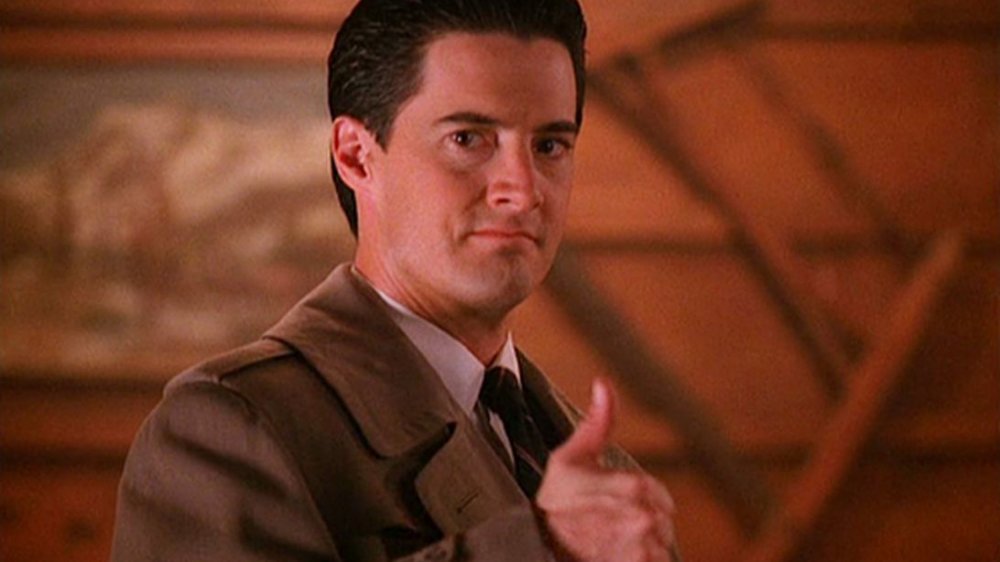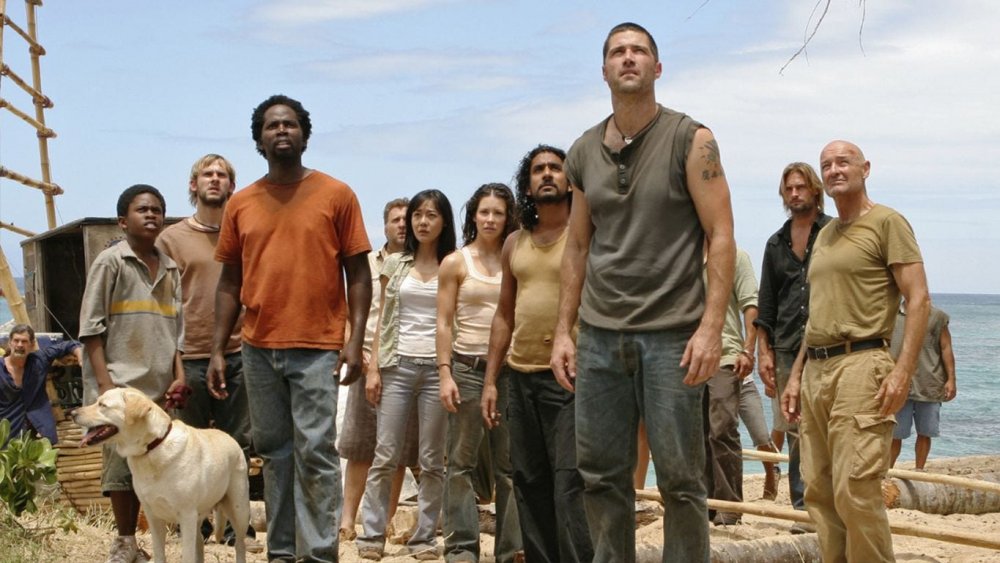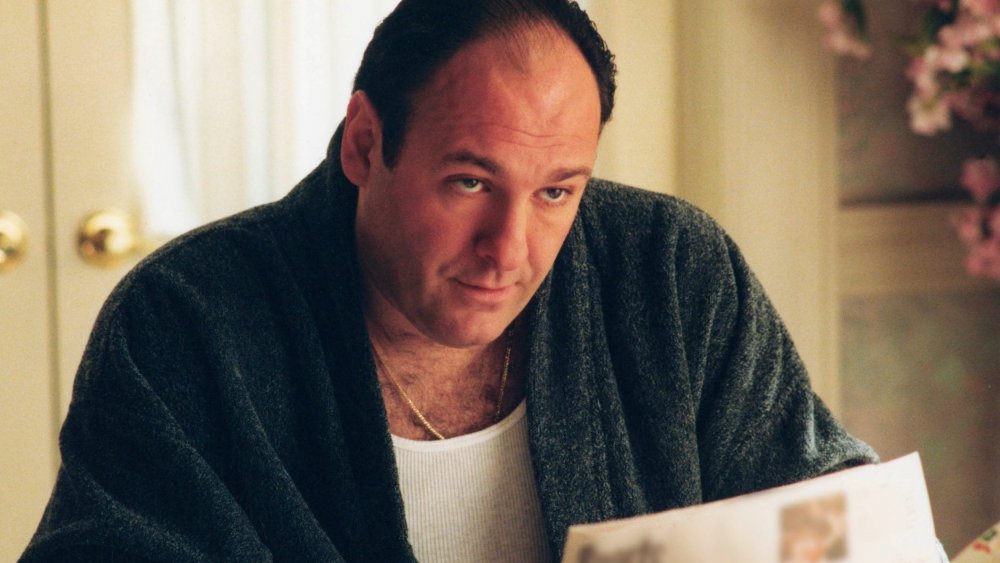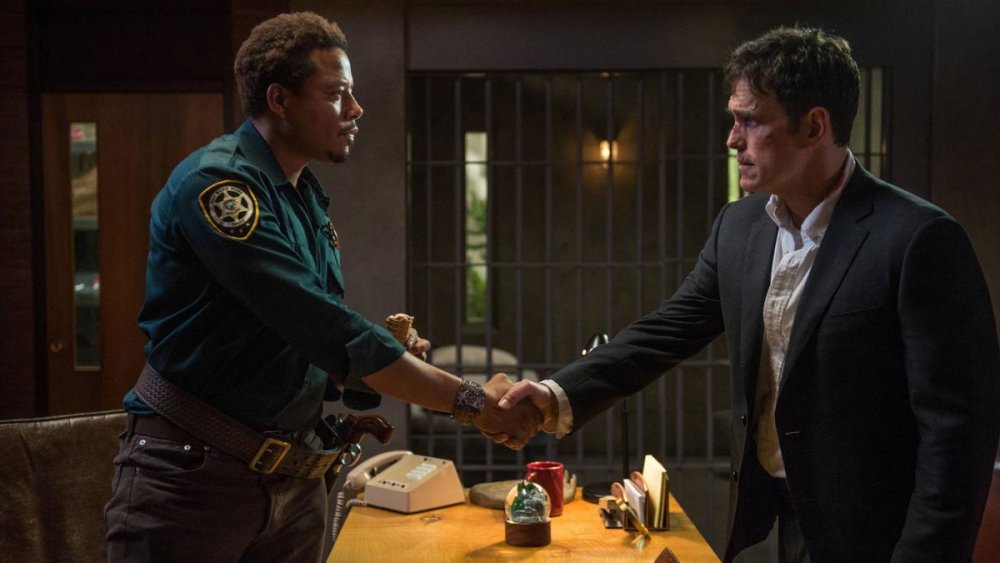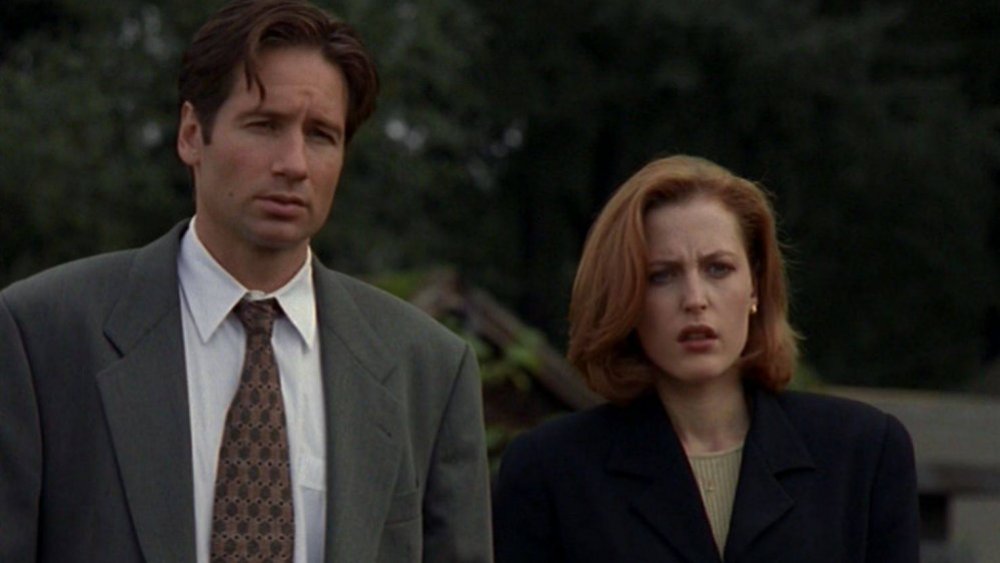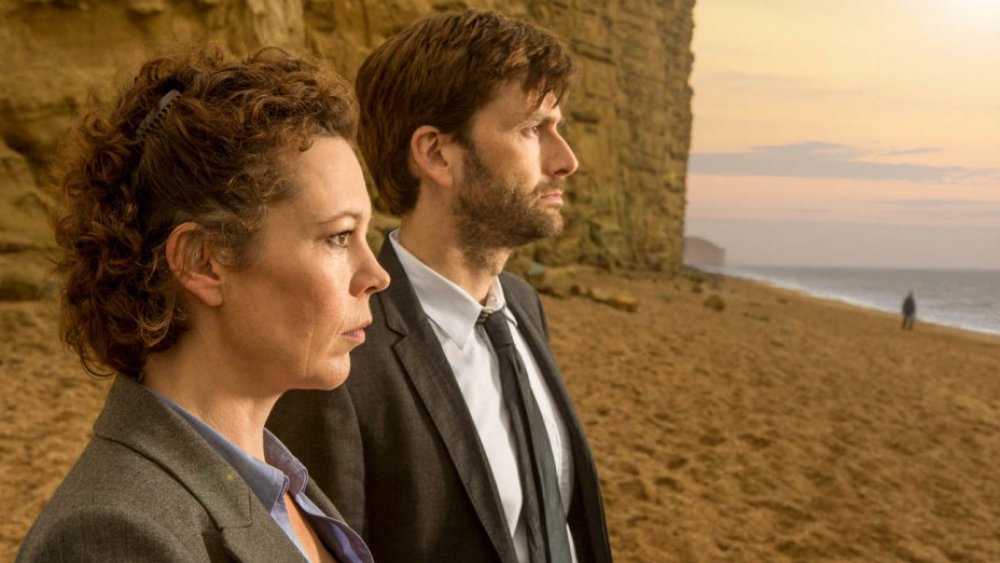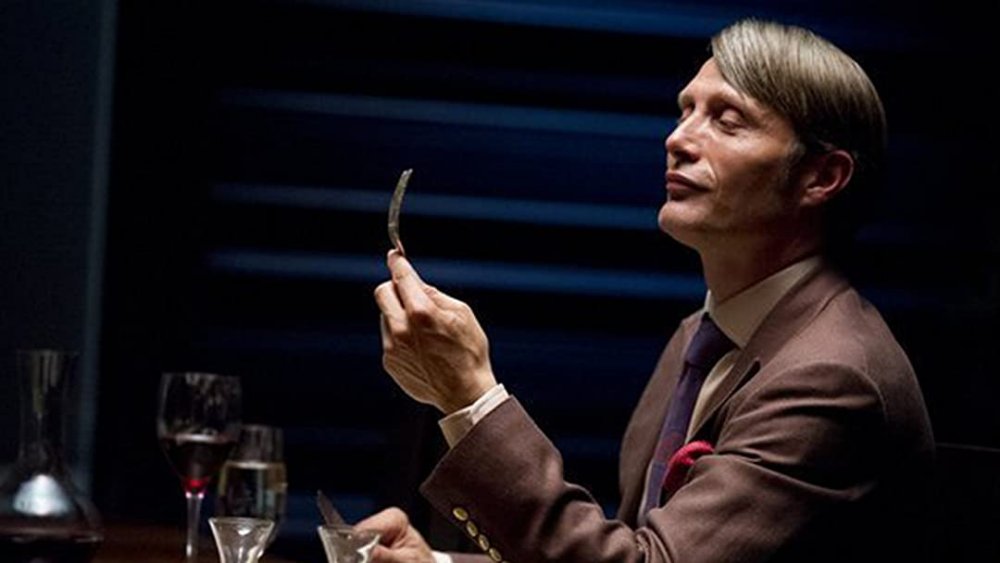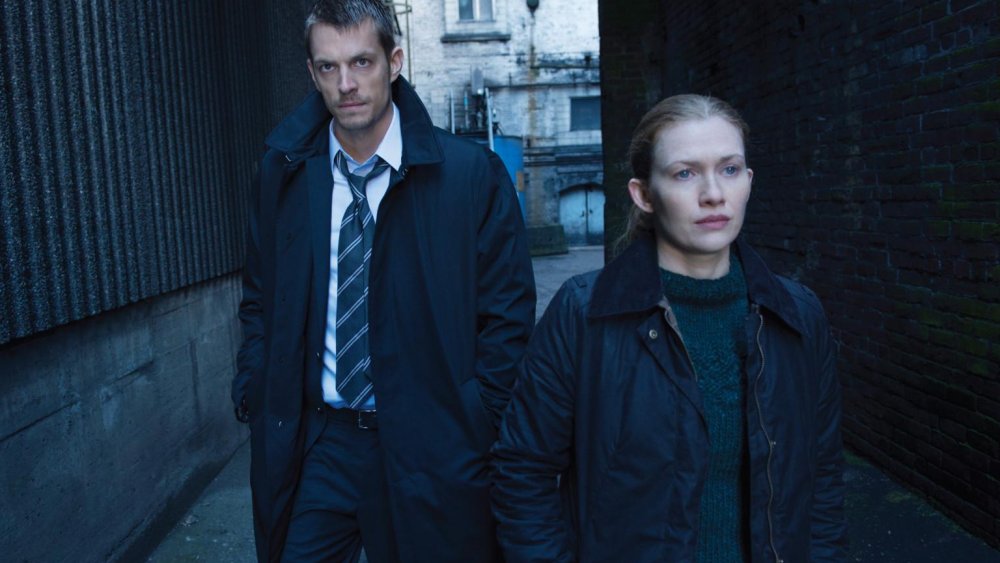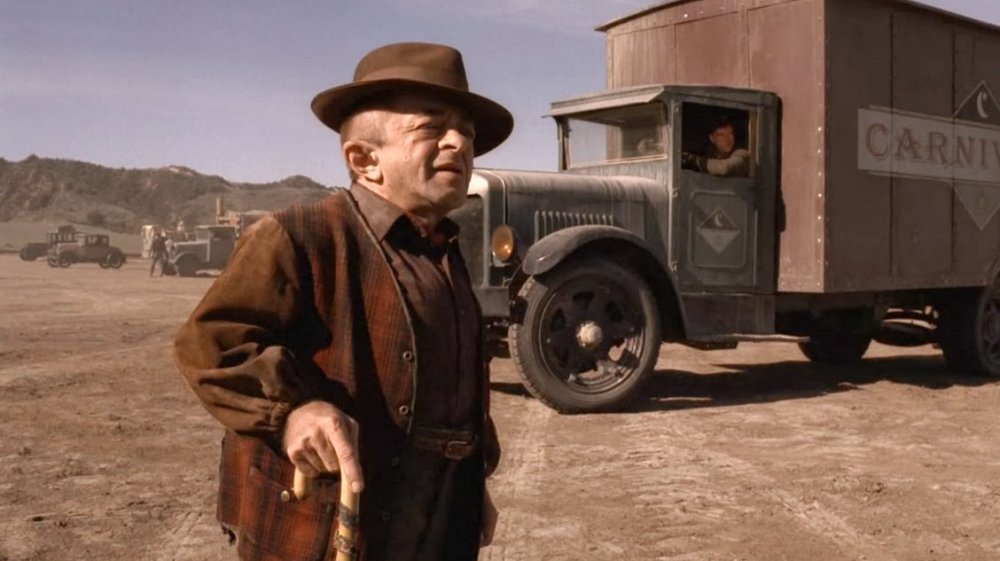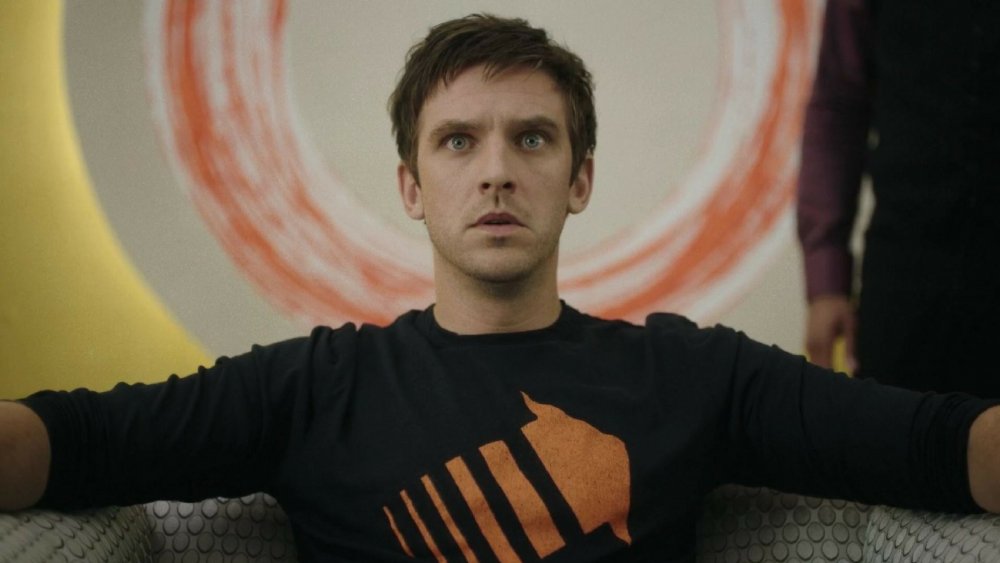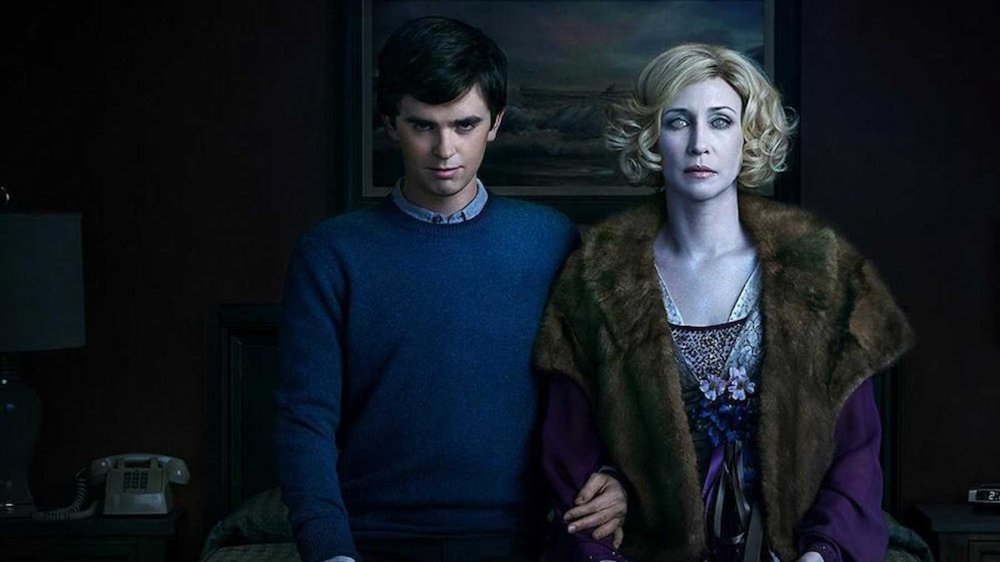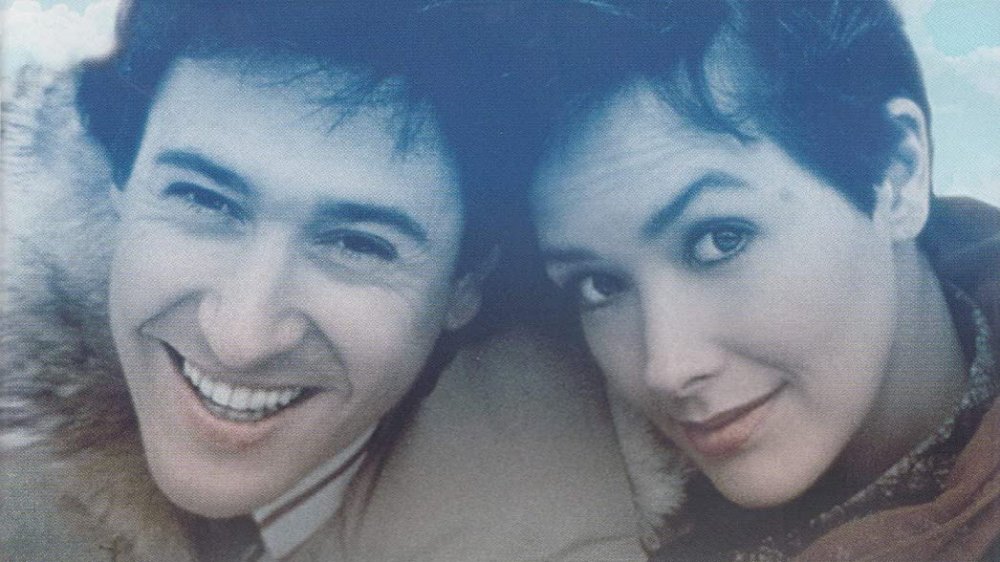TV Shows To Watch If You Like Twin Peaks
If you're a fan of Twin Peaks, it's probably tough to imagine you could ever find another television series quite like it. After all, when Mark Frost and David Lynch's creation premiered in 1990 with Laura Palmer (Sheryl Lee) found "dead, wrapped in plastic," there was nothing on TV quite like it, and decades later, there's still nothing that's managed to capture the same bizarre, often funny, and occasionally horrifying tone of Twin Peaks. Sometimes it feels like the most captivating whodunnit ever conceived, and other times, the lurking dread of the supernatural makes it feel like a Stephen King novel. And still other times, it's as silly and hilarious a parody of a daytime soap opera as Invitation to Love, the faux drama half of Twin Peaks' populace are obsessed with.
But while you're right that you'll probably never find anything quite like Twin Peaks, the series' influence lives on in other series. In particular, director David Lynch's innovative portrayal of dreams — and the nightmarish other-realm, the Black Lodge — has had a huge impact on other acclaimed TV directors' treatment of the surreal. There were also series released around the same time as Twin Peaks that might not have been directly impacted by its storytelling style but still shared interesting similarities. Whether it's because of direct inspiration or happy coincidence, here are other series we think you might enjoy if you like Twin Peaks.
Like Twin Peaks, Lost leaves you with lots of questions
A consistent theme in Twin Peaks is that everyone has secrets. Even the most seemingly pure and righteous characters harbor dark mysteries and sensitive indiscretions, especially the late Laura Palmer. Similar secrets come to light about the heroes of the ABC hit Lost. Following the survivors of a plane crash on a mysterious island, Lost often features flashbacks revealing surprising details about the heroes. For example, we learn that Charlie (Dominic Monaghan) is a drug addict, Jin (Daniel Dae Kim) was muscle for a Korean crimelord, and Sayid (Naveen Andrews) tortured people for the Iraqi Republican Guard.
Lost also uses a similar blend of science fiction and the supernatural as Twin Peaks, and sometimes it even manifests the same way. Twin Peaks often uses shots of thick forest trees swaying in the wind, coupled with haunting music, to hint at a great darkness waiting in the woods. Similarly, in Lost, one of the very first times we get a sense that something beyond the ordinary is going on is when the survivors notice the jungle trees swaying while something they can't see crashes through them.
Both series are also alike in that both end with unanswered questions. Even after Showtime's 2017 revival Twin Peaks: The Return, many of the series' biggest mysteries are left dangling, and Lost fans still debate some of that show's puzzles.
The Sopranos was influenced by Twin Peaks' bizarre dreams
You might think of a show like HBO's gangster saga The Sopranos as being the last series to have anything at all to do with Twin Peaks, but Sopranos creator David Chase would disagree. Speaking to New York Magazine in 2015, Chase said Twin Peaks made a powerful impact on his work, particularly when it comes to The Sopranos.
Maybe the most obvious similarity is the way both shows deal with dreams. While Tony Soprano (James Gandolfini) never finds himself in a red room talking to a dancing man dropping cryptic hints, dreams are an important part of the series and usually lead the dreamer to some kind of breakthrough. One of the most memorable instances is the second season finale "Funhouse," when food poisoning leads Tony to experience vivid dreams, including one where the voice of his friend, Big Pussy (Vincent Pastore), speaks through a fish and convinces him that his lieutenant is an informant for the feds. Likewise, in the following season's "Employee of the Month," it's a dream that leads Dr. Melfi (Lorraine Bracco) to the realization that she wants to use Tony to get revenge on the man who sexually assaulted her.
Wayward Pines isn't subtle about its influences
With the constant tree imagery in Twin Peaks, just the name Wayward Pines is reminiscent of the earlier series, but there are other commonalities between the shows. For starters, both series are led by federal agents traveling to a remote small town to investigate a crime. But instead of an FBI agent, Wayward Pines introduces us to Secret Service Agent Ethan Burke (Matt Dillon), who goes to Wayward Pines, Idhao, looking for two fellow agents who've gone missing.
With M. Night Shyamalan — a director known for his penchant for surprise endings — as one of the series' producers, it shouldn't be a surprise that Wayward Pines deals with a lot of secrets. The strange residents of the small town harbor dark mysteries, including Kate Hewson (Carla Gugino), one of the agents Burke was looking for who he finds inexplicably living in Wayward Pines as if nothing had happened. By the end of the first episode, Agent Burke learns he'll be staying in the idyllic little town for much longer than he anticipated, just as Cooper stays in Twin Peaks for quite a bit longer than he planned. But in Burke's case, it has more to do with Sheriff Pope (Terrence Howard) proving to be nothing like the friendly Sheriff Truman (Michael Ontkean) of Twin Peaks and taking the choice away from him.
The FBI agents of The X-Files face all sorts of supernatural mysteries
The very premise of The X-Files is reminiscent of Twin Peaks in that it sets up FBI agents as heroes determined to unravel unexplained phenomena. While the overall mythology of The X-Files is more interested in aliens from outer space than dark spirits like Twin Peaks' malevolent Bob (Frank Silva), some of The X-Files' best episodes have its agents taking a break from chasing aliens to look into more supernatural threats.
Perhaps the biggest difference between agents Cooper and Mulder (David Duchovny) is their handling of the unexplained. While Cooper never seems to be particularly skeptical of the notion of the supernatural, he's also not obsessed with it like Mulder. Cooper may trust dreams to give him clues and throw rocks at bottles as an investigative technique, but he never assumes — as Mulder almost always does — that Laura Palmer's killer would have a supernatural connection.
There's a more direct connection between The X-Files and Twin Peaks. While his time as Fox Mulder on The X-Files will likely be what he's most remembered for, Duchovny has one of the most memorable recurring roles on Twin Peaks. He plays DEA agent Denise Bryson, a transgender woman Cooper initially knows as "Dennis" before she transitions. The role was radical for its time because, as The Daily Beast notes, most trans characters in film and TV in the early '90s were treated either as villains or as subjects of mockery. Bryson, on the other hand, is heroic and sympathetic.
Twin Peaks helped inspire Broadchurch
In 2013, Broadchurch creator Chris Chibnall told Entertainment Weekly that Twin Peaks was one of two shows (the other being the legal drama Murder One) he looked to for inspiration while writing his detective series.
Set in the fictional town for which its named, Broadchurch focuses mainly on the investigation into the murder of 11-year-old Danny Latimer. Tasked with finding the killer are detectives Alec Hardy (David Tennant) and Ellie Miller (Olivia Colman). Like Twin Peaks, Broadchurch deals not only with a murder investigation but with both the secrets being kept in this small coastal town and the devastating impact Latimer's death has on the community.
There are no evil spirits in Broadchurch to be blamed for the crimes, and there are no backwards-speaking men bothering the detectives in their dreams, but otherwise, the series is an exceptional successor to Twin Peaks, including a chemistry between its detectives reminiscent of the earlier series' Agent Cooper and Sheriff Truman. Receiving almost universal praise from critics, it's worth your time even if you've never watched Twin Peaks.
Hannibal borrows from the nightmares of Twin Peaks
There's a really good chance that Hannibal creator Bryan Fuller is a bigger Twin Peaks fan than you. Speaking to Entertainment Weekly in 2017 about his anticipation for the Twin Peaks revival, Fuller wasn't shy about his love for the show, saying, "Twin Peaks is at the very top of my list for revivals that I need to put in my eye-holes." Among other things, Fuller says he can still tell you where he was when Laura Palmer's cousin, Maddy (also played by Sheryl Lee), was murdered, and he called watching the series "a religious experience." According to Fuller, Twin Peaks influences "everything" he does.
In terms of Hannibal — the psychological thriller based on the strange relationship between Dr. Hannibal Lecter (Mads Mikkelsen) and FBI investigator Will Graham (Hugh Dancy) from Thomas Harris' novels — Fuller said one of the most direct ways Twin Peaks influences the series is the musical score. "So many lessons from [David] Lynch were applied in the sound design of Hannibal and Brian Reitzell's score," Fuller told EW. "He weaves many different things into his sound design to maximize your ability to empathize with a broken character and a broken world."
In 2014, Vulture seemed to agree that Fuller and Reitzell's method was the right way to go, calling Hannibal's score "the closest someone's come on TV to soundtracking the experience of losing one's marbles."
The Killing shares a singular focus with David Lynch's TV show
As soon as you start watching The Killing, it's impossible to not be reminded of Twin Peaks. The series is set in Seattle, and characteristically, it almost always seems to be either raining or just about to rain. Just as Laura Palmer's tragic death is the main focus of Twin Peaks, the first two seasons of The Killing revolve around the death of Rosie Larsen. And just as Laura Palmer's death sends shock waves of grief through her hometown, The Killing deals with how Larsen's murder impacts not just her family and community but the political structure of the Emerald City.
Perhaps where The Killing differs most from Twin Peaks is in the dysfunctional lives of its detectives. Mireille Enos stars as Sarah Linden, a homicide detective who starts off desperate to leave the world of homicide behind and marry her fiancee, Rick (Callum Keith Rennie). Joel Kinnaman plays Stephen Holder, a recovering addict who starts off as Sarah's intended replacement. At first, there's plenty of friction between the two, as Sarah initially sees the new guy as arrogant. Eventually they learn to trust each other, even with the darkest secrets you could imagine.
Carnivale features a familiar face
Michael J. Anderson's starring role in HBO's Carnivàle is the series' most direct and obvious connection to Twin Peaks. On Carnivàle, Anderson plays Samson, the manager of a traveling carnival during the Great Depression. Twin Peaks fans will immediately recognize him as the actor who brought the enigmatic Man from Another Place to life — a being who appears to be one of the hosts of the Black Lodge and visits Agent Cooper in his dreams early in the series.
But Anderson isn't the only reason Peaks fans will find themselves at home watching Carnivàle. Like David Lynch and Mark Frost's creation, Carnivàle gives us a conflict that reaches beyond the "real" world. Over the course of the series, we slowly learn that the people who make up the traveling show are part of a supernatural conflict between good and evil, just as the true clash in Twin Peaks is between the otherworldly White and Black Lodges.
Sadly, another aspect of Carnivàle that will be familiar to Peaks fans is that it will leave them with plenty of unanswered questions. In spite of critical acclaim, Carnivàle was canceled after its second season just like Twin Peaks, leaving plenty of dangling mysteries for its fans.
The psychic world of Legion feels like the Black Lodge
There aren't many TV shows based on Marvel Comics that you'd expect would have a lot in common with Twin Peaks, but Fox's Legion definitely fits the bill. The series stars Dan Stevens as David Haller, the son of Professor X and a schizophrenic mutant with powerful psychic abilities. Haller's nemesis is Amahl Farouk, aka the Shadow King (Navid Negahban), a parasitic mutant who wages psychic war with Haller on the astral plane.
The bizarre, trippy visuals of Legion are reminiscent of the equally dreamy and nightmarish Lodge of Peaks, and as an evil spirit searching for a body to call home, the Shadow King can feel a whole lot like Frank Silva's grinning villain, Bob. Legion creator Noah Hawley has gone on the record about Twin Peaks' influence on both Legion and his other series Fargo. In a 2017 guest column for TV Insider, Hawley wrote, "I refer to [David] Lynch's work a lot in Legion's uncanniness. The concept of the uncanny basically boils down to: What scares us most is not what you can't see, but when familiar things act in unfamiliar ways."
Bates Motel has an incredibly creepy vibe
Based on Alfred Hitchcock's 1960 classic Psycho, A&E's Bates Motel can't help but feel like Twin Peaks. For one, even though Psycho found its setting in California, Bates Motel moves northwest to the fictional town of White Pine Bay, Oregon. For another, Bates Motel's second season has its own Laura Palmer. The plot focus for season two is the murder of the young Norman's (Freddie Highmore) teacher Miss Watson (Keegan Connor Tracy). Over the course of the season, more and more details about the teacher's mysterious life come to light, just as in Twin Peaks we eventually learn Laura Palmer had so much secret stuff going on before her death (e.g., secret affairs, drug deals, trips across the border to a Canadian casino) that it's honestly surprising she was able to free up enough time in her schedule to get murdered.
During a 2013 panel discussion on Bates Motel, Carlton Cuse — one of Bates Motel's creators — was clear about Peaks' influence on his show. "We pretty much ripped off Twin Peaks," Cuse joked. "I loved that show. They only did 30 episodes. [Co-creator Kerry Ehrin] and I thought we'd do the 70 that are missing."
Northern Exposure is like a lighter version of Twin Peaks
Only three months after audiences were introduced to Agent Dale Cooper and the mystery of Laura Palmer's untimely death, CBS premiered Northern Exposure. In this show, Dr. Joel Fleischman (Rob Morrow) moves to the fictional town of Cicely, Alaska, where he's contractually obligated to practice due to the terms of his student loans. A New Yorker by birth, Fleischman finds it difficult to adjust to this small town and its quirky, eccentric characters.
Northern Exposure is a mostly lighthearted dramedy that doesn't include any demonic spirits or teenage bullies barking like hellhounds in a prison cell. But there are other similarities that might appeal to the tastes of a Twin Peaks fan. While Dale Cooper certainly had a much easier time adjusting to Twin Peaks than Fleischman does figuring out his place in Cicely, both series feature heroes as a fish out of water in remote northern (or, more specifically, northwestern in the case of Peaks) towns. They also both give viewers a cast of strange but likable locals. There are probably no super strong women ready to kill their husbands over the invention of silent drape runners like Twin Peaks' Nadine (Wendy Robie) in Cicely, but that doesn't mean they can't be just as singularly interesting.
